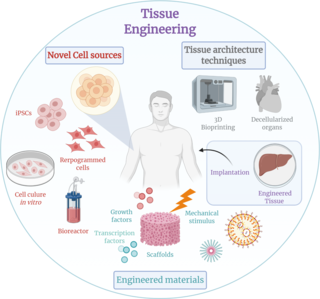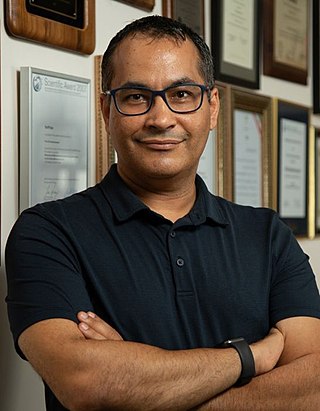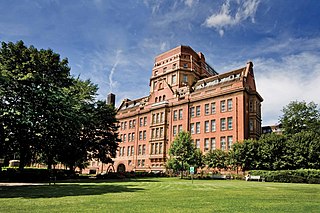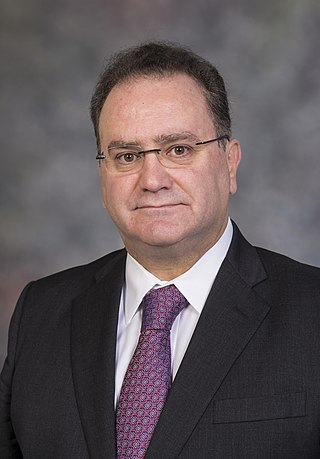
Tissue engineering is a biomedical engineering discipline that uses a combination of cells, engineering, materials methods, and suitable biochemical and physicochemical factors to restore, maintain, improve, or replace different types of biological tissues. Tissue engineering often involves the use of cells placed on tissue scaffolds in the formation of new viable tissue for a medical purpose, but is not limited to applications involving cells and tissue scaffolds. While it was once categorized as a sub-field of biomaterials, having grown in scope and importance, it can is considered as a field of its own.

Ali Khademhosseini is the CEO of the Terasaki Institute, non-profit research organization in Los Angeles, and Omeat Inc., a cultivated-meat startup. Before taking his current CEO roles, he spent one year at Amazon Inc. Prior to that he was the Levi Knight chair and professor at the University of California-Los Angeles where he held a multi-departmental professorship in Bioengineering, Radiology, Chemical, and Biomolecular Engineering as well as the Director of Center for Minimally Invasive Therapeutics (C-MIT). From 2005 to 2017, he was a professor at Harvard Medical School, and the Wyss Institute for Biologically Inspired Engineering.

Tejal Ashwin Desai is Sorensen Family Dean of Engineering at Brown University. Prior to joining Brown, she was the Deborah Cowan Endowed Professor in the Department of Bioengineering and Therapeutic Sciences at University of California, San Francisco, Director of the Health Innovations via Engineering Initiative (HIVE), and head of the Therapeutic Micro and Nanotechnology Laboratory. She was formerly an associate professor at Boston University (2002–06) and an assistant professor at University of Illinois at Chicago (1998–2001). She is a researcher in the area of therapeutic micro and nanotechnology and has authored and edited at least one book on the subject and another on biomaterials.

The Department of Materials, at the University of Manchester is an academic and research department specialising in Materials Science and Engineering and Fashion Business and Technology. It is the largest materials science and engineering department in Europe. This is reflected by an annual research income of around £7m, 60 academic staff, and a population of 150 research students and 60 postdoctoral research staff. The Department of Materials was formerly known as the School of Materials until a faculty-wide restructuring in 2019.
Kristi S. Anseth is the Tisone Distinguished Professor of Chemical and Biological Engineering, an Associate Professor of Surgery, and a Howard Hughes Medical Investigator at the University of Colorado at Boulder. Her main research interests are the design of synthetic biomaterials using hydrogels, tissue engineering, and regenerative medicine.

Gordana Vunjak-NovakovicFRSC is a Serbian American biomedical engineer and university professor. She is a University Professor at Columbia University, as well as the Mikati Foundation Professor of Biomedical Engineering and Medical Sciences. She also heads the laboratory for Stem Cells and Tissue Engineering at Columbia University. She is part of the faculty at the Irving Comprehensive Cancer Center and the Center for Human Development, both found at Columbia University. She is also an honorary professor at the Faculty of Technology and Metallurgy at the University of Belgrade, an honorary professor at the University of Novi Sad, and an adjunct professor at the Department of Biomedical Engineering at Tufts University.
The in vivo bioreactor is a tissue engineering paradigm that uses bioreactor methodology to grow neotissue in vivo that augments or replaces malfunctioning native tissue. Tissue engineering principles are used to construct a confined, artificial bioreactor space in vivo that hosts a tissue scaffold and key biomolecules necessary for neotissue growth. Said space often requires inoculation with pluripotent or specific stem cells to encourage initial growth, and access to a blood source. A blood source allows for recruitment of stem cells from the body alongside nutrient delivery for continual growth. This delivery of cells and nutrients to the bioreactor eventually results in the formation of a neotissue product.
Treena Livingston Arinzeh is professor of biomedical engineering at Columbia University in New York, New York, joining in 2022. She was formerly a Distinguished Professor in Biomedical Engineering at the New Jersey Institute of Technology in Newark, New Jersey. She is known for her research on adult stem-cell therapy. Arinzeh takes part in the American Chemical Society's Project Seeds program, opening up her lab for high school students from economically disadvantaged backgrounds for summer internships.

Antonios Georgios Mikos is a Greek-American biomedical engineer who is the Louis Calder Professor of Bioengineering and Chemical and Biomolecular Engineering at Rice University. He specialises in biomaterials, drug delivery, and tissue engineering.
Alicia El Haj is a Professor and the Interdisciplinary Chair of Cell Engineering at the School of Chemical Engineering and the Healthcare Technologies Institute at the Institute of Translational Medicine, University of Birmingham. She is the President of the UK Bioengineering Society and Director of MICA Biosystems. She is a Fellow of the Royal Academy of Engineering. She was president of the European Council of the International Society for Tissue Engineering and Regenerative Medicine.

Joyce Y. Wong is an American engineer who is Professor of Biomedical Engineering and Materials Science and Engineering at Boston University. Her research develops novel biomaterials for the early detection treatment of disease. Wong is the Inaugural Director of the Provost's Initiative to promote gender equality and inclusion in STEM at all levels: Advance, Recruit, Retain and Organize Women in STEM. She is a Fellow of the American Association for the Advancement of Science, American Institute for Medical and Biological Engineering and Biomedical Engineering Society.
Thomas J. Webster is an American biomedical engineer, researcher, and entrepreneur. Throughout his over 25-year academic career, his research group has produced several books and book chapters. He has over 1350 publications and has an H-index of 118. This high H-index places him amongst the top 1% of researchers in his field.

Milica Radisic is a Serbian Canadian tissue engineer, academic and researcher. She is a professor at the University of Toronto’s Institute of Biomaterials and Biomedical Engineering, and the Department of Chemical Engineering and Applied Chemistry. She co-founded TARA Biosystems and is a senior scientist at the Toronto General Hospital Research Institute.
Ipsita Roy is a British-Indian materials scientist who is a professor at the University of Sheffield. Her research considers natural polymers of bacterial origin for medical applications. She was elected to the New York Academy of Sciences in 1997 and serves as the Editor of the Journal of Chemical Technology & Biotechnology.
Shelly R. Peyton is an American chemical engineer who is the Armstrong Professional Development Professor in the Department of CHemical Engineering at the University of Massachusetts Amherst. Her research considers the development of biomaterials to investigate metastatic cancer and potential new therapies.
Elizabeth Cosgriff-Hernandez is an American biomedical engineer who is a professor at the University of Texas at Austin. Her work involves the development of polymeric biomaterials for medical devices and tissue regeneration. She also serves on the scientific advisory board of ECM Biosurgery and as a consultant to several companies on biostability evaluation of medical devices. Cosgriff-Hernandez is an associate editor of the Journal of Materials Chemistry B and Fellow of the International Union of Societies for Biomaterials Science and Engineering, Biomedical Engineering Society, Royal Society of Chemistry, and the American Institute for Medical and Biological Engineering.
Surita Bhatia is an American chemist who is professor and vice provost of faculty affairs at Stony Brook University. Her work considers the structure of soft materials, including polymeric hydrogels and colloidal glasses. She was elected Fellow of the American Institute of Chemical Engineers, the American Institute for Medical and Biological Engineering and the Society of Rheology in 2020.
Tatiana Segura is an American biomedical engineer who is a professor at Duke University. Her research considers biomedical engineering solutions to promote cell growth. She was elected Fellow of the American Institute for Medical and Biological Engineering in 2017 and awarded the Acta Biomaterialia Silver Medal in 2021.

Karen Leigh Christman is an American bioengineer who is the Associate Dean for Faculty Affairs and the Pierre Galletti Endowed Chair for Bioengineering Innovation at University of California, San Diego. Her research considers regenerative medicine and tissue engineering. She was elected a Fellow of the National Academy of Inventors in 2023.
Kristyn Simcha Masters is an American bioengineer who is professor and Chair of the Department of Bioengineering at the University of Colorado Denver. She works as Director of the Anschutz Medical Campus Center. Her research looks to create tissue-engineered models of disease, with a focus on cancer and cardiac disease.








